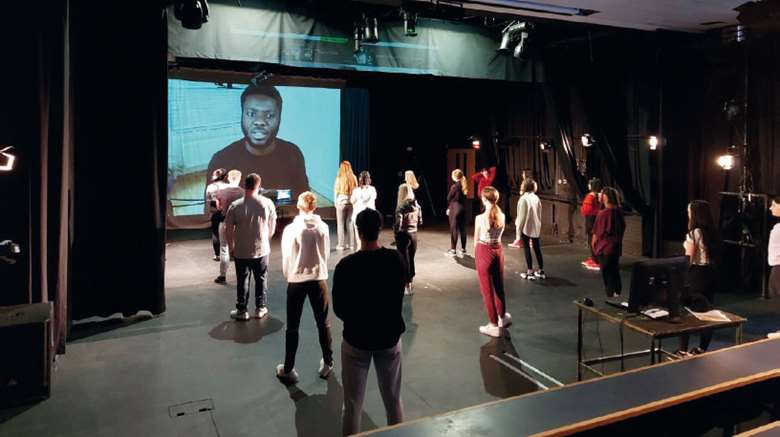Online devising and physicality workshop (14+)
Mat Walters
Monday, February 1, 2021
A storming session led by an expert who really knows how to get the students moving.

COURTESY FRANTIC ASSEMBLY
Drama workshops over Zoom usually fill me with dread, especially those focusing on physical theatre. But Frantic Assembly have found a way to tailor this medium to their strengths as a company, and after two packed, music-filled hours full of signature Frantic Assembly moves and techniques, my GCSE and A level students are full of buzz and excitement.
Maya at Frantic made the booking and confirmation process a breeze. An email and then a phone call with Steve Kirkham, our workshop leader, proved invaluable in terms of touching base and going through the basics of the group sizes and what I wanted our students to get out of the experience. An 8:10am Zoom log-in on the day of the actual workshop proved that Zoom is, once again, a lifesaver when it comes to remote teaching.
Steve appeared and immediately introduced himself to the students and asked what they knew about Frantic. My students have all seen The Curious Incident of the Dog in the Night-time and the A level students have seen Love song, so they have a rough idea of the kind of stylised physical theatre and importance of the use of music they are going to experience.
On the day
Steve is an excellent workshop leader, coping with the demands of Zoom effortlessly and setting the students activities that stretch them but also give them the confidence to see their work progress and reflect Frantic's signature style. The session began with some simple movement-based games, but even with these, we could already see how these movements, set to music (chosen and easily played through Zoom by Steve) related to the examples of Frantic Assembly's work we have seen in their shows.
Students’ work is driven by the music, as we would expect from Frantic, but sudden drops to the ground, turns to the camera, stillness and heads moving in time to the beat already create the feeling of being part of an ensemble, and each movement has a purpose, a focus of the workshop continually emphasised by Steve. There is always a dynamic that helps to tell the story, we are told, and the exercises bear this out.
The quick-fire games at the start lead into a three-minute aerobic, fast-paced warm up, full of lunges, star jumps and stretches which leaves my students red faced but ready. Again, each exercise is rooted in the Frantic style of performance. Steve demonstrates and leads all the movements on camera, ably adjusting the webcam to focus on feet positions and movement techniques so the students can copy.
I make a note of all these moves and think about how this could be used to wake up sleepy students on a Monday morning. Steve calls out and comments, encouraging the students to push themselves and suddenly it does not really feel like a Zoom workshop at all.
After a quick glug of water, we were back at it. Exercises develop specific physical theatre and movement techniques, and even my students who usually baulk at the idea of “physical theatre” were moving in time and exaggerating their physicality to convey emotions and relationships. The importance of starting with a very simple sequence of movements is absolutely highlighted to the students, making the exercises and outcomes achievable by all.
Devising inspiration
I talked to my students and asked them to remember this exercise and make notes. It is clear that all they have done so far could be built into a devised or scripted piece. Suddenly they realised that they too could create a moment like Christopher Boone coming home to his bedroom in Curious Incident and showing us his daily routine through physical theatre, because it also started with a sequence of simple movements.
Steve suggests additions to the movement sequence which the students can include. These are challenging, physical ideas which push the students, but when added, really lift the work. This is ideal stuff for GCSE and A level.
We move into an exercise which specifically relates to characterisation and storytelling. Students quickly interview each other, easily achievable on Zoom, and find out key information about their partner, including hobbies, interests, current outfit and places they love or would like to visit. This information is quickly turned into a simple, short speech and then key aspects of that information is physicalised, then exaggerated. Suddenly a character is simply and effectively brought to life before our eyes.
Steve watches each one and feeds back expertly, a gesture changed here, a movement added and polished there. Sequences are then repeated with music added and without words. Simple and stylish, imaginative physical theatre appears from my students and tells a story. The movement is purposeful, punchy and confident. I can see them thinking, ‘we can use this’ and, more importantly, ‘we can do this’.
This was a storming session led by an expert who really knows how to get the students moving, but most importantly, with a theatrical purpose. I cannot recommend Frantic Assembly's online workshops highly enough.

